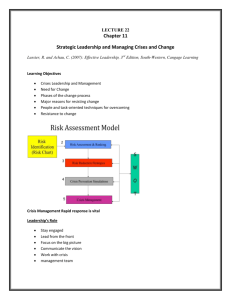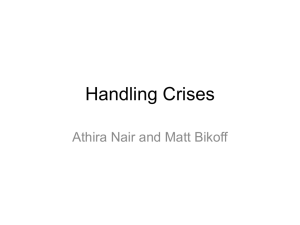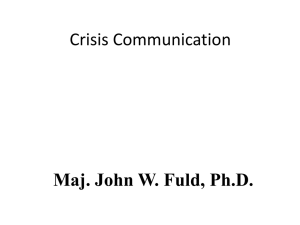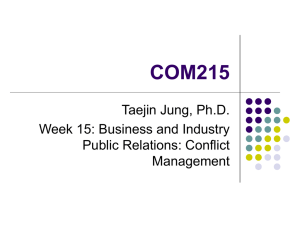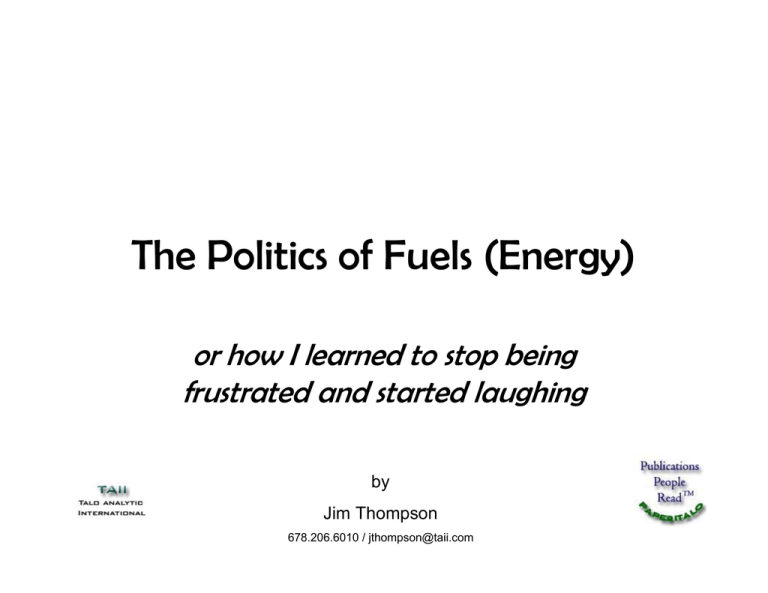
The Politics of Fuels (Energy)
or how I learned to stop being
frustrated and started laughing
by
Jim Thompson
678.206.6010 / jthompson@taii.com
A little review…
1.
2.
3.
4.
5.
“Gold Rushes” of recent times
Recycling
Dot com
Enron
WorldCom
Wall Street—subprime loans
News Flash
Today’s rush for a solution to the
“Energy Crisis” is absolutely no
different
BTW, I prefer not to call it a
crisis, but by its real name:
The Fuels’ Earth Day
Premium
There are five political matters
you need to watch:
I.
II.
III.
IV.
V.
Adjectives
Science
Personal motivations
Follow the money
Wrong motivations
I. When we say “fuel” or “energy”
we assume the following adjectives
are in play:
1.
2.
3.
4.
5.
6.
Clean
Environmentally friendly (whatever this
means)
Safe (whatever this means)
Cheap
Portable
Here (available where we want it, when we
want it)
Also, we are resistant to change
the way we live our lives:
Quickest way to the solve the
“energy crisis”…
Eliminate office buildings and
attendance at sporting
events.
II. Science—watch for alchemy!
1. Conservation of energy
2. Mass balance
3. Thermal/Corrosion Dichotomy
Particularly confusing to this old
farm boy is VPP (Value Prior to
Pulping)
I have been around a lot of pulp
mills and have never noticed
anything lying around that we
are not using already.
III. Personal motivations
1.
2.
3.
Shocking, shocking, but there are those that envision
statues erected in their honor for solving the “energy
crisis”!
Pay me lots of money and I will solve the problem—
trust me!
There are also those that never want to answer the
question (solve the problem) because then they will
have to find something else to do.
IV. Follow the money…
1.
2.
3.
4.
Developers that want fees but no risks.
Developers that want equity but put up
nothing.
Outsized fees --$100 million raised, 3%
“development fee” upfront. $3 million is real
money!
Question to ask any
developer/promoter/bloviator: “How have
you earned your income over the last twenty
years and (a) can you prove you have taken
risks & (b) can you prove you have made
significant returns for your employers and/or
investors?”
IV. Follow the money…
5. Subsidies and government funding
are suspect:
Items developed without subsidies:
light bulb, motion pictures, phonograph, distribution
systems for electricity….
Items subsidized forever:
agriculture, railroads, automobiles (highways)….
V. Wrong motivations…
1. Saving old assets
2. Saving jobs
Review:
I.
II.
III.
IV.
V.
Adjectives
Science
Personal motivations
Follow the money
Wrong motivations
In other words:
One must obey the rules of:
Science
Economics
Speaking of Economics…
So far, I have been talking about
micro-economics.
What about macro?
How have macro-economics
affected political outcomes in
past energy crises?
How about Jimmy Carter’s shale
oil project?
Exxon pulled out on 2 May 1982
Source: Department of Energy
Exxon Abandons
Jimmy’s Project
Source: Department of Energy
Source: Department of Energy
Source: Department of Energy
Source: Department of Energy
?
Source: Department of Energy
It always comes down to return
on investment.
Boone Pickens is the only
one that is talking
about national security.
In fact, until Katrina, OPEC had the
discipline to keep oil prices low
enough to create complacency.
The US response to previous
energy crises:
1973: 55 mph speed limit (1973 –
1995) Touted as reducing
consumption by 2.2%;
independent studies said
reduction was less than ½ of 1%
The US response to previous
energy crises:
1973: Even/Odd days of filling one’s
auto.
Year ‘round daylight savings
time.
The US response to previous
energy crises:
1973: Push for solar, wind, drilling at
home, coal, nuclear
Sound familiar?
The US response to previous
energy crises:
1979: Wear a sweater, lower the
thermostat, shale oil will save us!
The US response to old energy
crises:
1942 - 1945: National Speed limit set
at 35 MPH; Rationing cards for
fuel and tires.
The US response to old energy
crises:
The Crisis that never happened:
The 1930’s would have perhaps produced
the first crisis had it not been for the
Great Depression.
The current crisis is being solved
by:
Recession in some economies
Depression in others.
Just like the one that didn’t happen in the
1930’s
The drop in oil prices is even
solving the security issue:
Russian, Iranian, and Venezuelan Oil
Revenues in November will be half
what they were in July.
The leaders of these countries will have to
refocus on internal unrest rather than
creating mischief abroad.
The current crisis is over.
Do we as a nation have the
discipline to stay the course on
seeking alternatives to oil?
More importantly, should we?
Final Thought:
There is only a fuels (energy)
crisis if you are willing to live in
society’s arbitrary boxes.
This Presentation is available in the White Paper Library on
Nip Impressions® and PaperMoney®
http://www.globalpapermoney.com/news.php?viewStory=2279
under the title
“The Politics of Fuels (Energy)”
Copyright 2008 TAII, all rights reserved.




